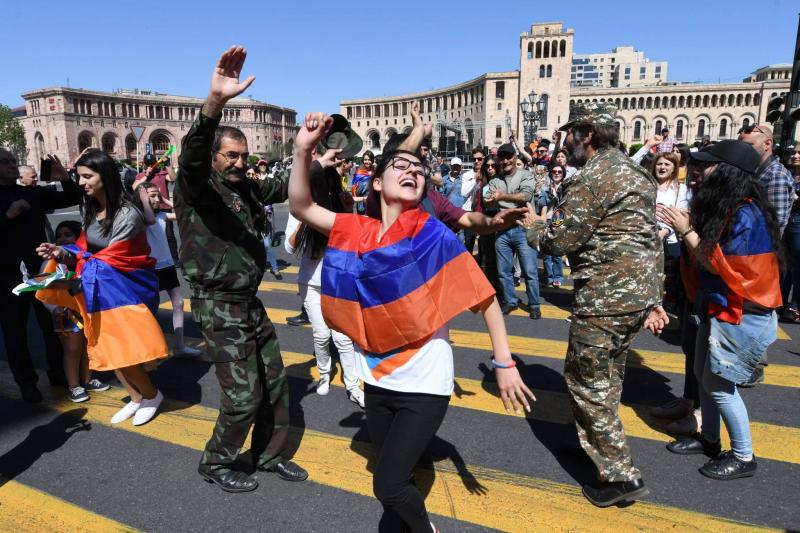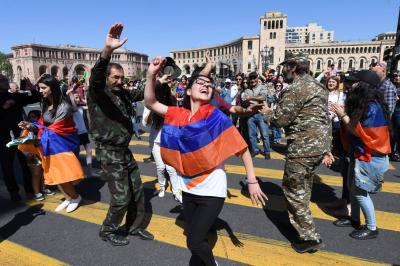The streets of the Armenian capital, Yerevan, are filled with protesters wanting to oust the Prime Minister to prevent him from signing a peace agreement with Azerbaijan, under which the Armenian government would concede the last four villages gained by Armenia in the Nagorno-Karabakh region after the fall of the Soviet Union. This region became famous due to wars, where the majority of the population was Armenian, but it was under Azerbaijani sovereignty during Soviet times. After the Soviet peace ended in 1991 and the independence of countries in Central Asia and the Caucasus, three waves of clashes or wars occurred over the region. Armenia, with the help of Russia and Iran, won the first two wars, while Azerbaijan won the last war with Turkey's support. The four villages have been abandoned by their residents, migrating to Armenia like tens of thousands of others, but Azerbaijanis have not advanced towards them due to the presence of the Russian army at the frontline, which has now withdrawn, accompanied by Armenian accusations that it sided with Azerbaijan in the last war!
All these details lead to a notable variable: protests against Pashinyan are not new, but the new aspect is that an Armenian Orthodox Church bishop is leading the latest wave. The bishop argues that the four villages, and the entire region, carry religious memories and contain historical churches destroyed by Azerbaijanis, who deny this. The Orthodox Christianity, which the Russians have abandoned, is the target, and the Prime Minister is on the verge of yielding and forsaking the religious and national legacy because he fears an Azerbaijani attack that the defeated army cannot withstand. While the Prime Minister maintains that he will only concede to Armenia its Soviet-era borders established in 1922, he questions the need to suffer defeat once more.
The Balkans, Central Asia, and the Caucasus, where their small and medium-sized ethnic units awakened in the nineteenth century, were among the causes of World War I. These regions are well-known for the rise of nationalisms that demanded independence from the Austro-Hungarian, Ottoman, and Russian empires in contradictory directions. Often, but not always, the awakening ethnicities rely on religion to strengthen their claims to specific lands or religious significance. This phenomenon has recently returned, with the small Serbian population in Bosnia and Kosovo (in particular) adhering to sites, marks, and religious memories during the spread of Christianity in the region, which has now become predominantly Muslim.
This solidarity between nationalism and religion is evident in predominantly Buddhist Myanmar against the Muslim Rohingya minority. A few days ago, on the eve of elections, Indian Prime Minister Modi visited a religious site dedicated to the god Rama, built years ago on the ruins of a mosque that Muslims reportedly erected there in place of a Hindu temple in the seventeenth century! Additionally, hardline Israelis intermittently raid the Al-Aqsa Mosque and the Ibrahimi Mosque, always under the pretext of religious legitimacy and affirming the correct faith, which is also linked to geography.
American researcher Scott Heffernan, in his 2009 book on secular states and the exploitation of religion, argued that some political leaders evoke and exploit religious sensitivities for popular gain. These do not rely on genuine religious feelings, but rather are intended to incite fears, spread hatred, and foster intolerance to control the populace or segments of it, often through illusions and exaggeration of surrounding dangers. He mentions that even Indira Gandhi, the former Prime Minister of India from the historically secular Congress Party, competed with the right on Hindu religious sentiments. In the current tenure of the Bharatiya Janata Party led by Modi, no evidence is necessary. The reality is that in India, national and religious sensitivities do not serve well in the long run. The same applies to the U.S., which is rich in nationalities and religions.
Heffernan cited examples from the U.S., India, and Egypt. However, the reliance on religion to support national identity applies only to India among the three cases. Thus, Fukuyama in his book on identity, dignity, and resentment (2017) concluded that feelings of identity and uniqueness in Europe and the U.S. differ from those in Asia and Africa. Religion does not play a prominent role despite much discussion about Islam. Finally, there is a discourse on the economy among the major powers who regard technological revolutions and climate change as fundamental causes of global unrest, including the emergence of national and religious challenges, viewed as reactions to major global anxieties, which political and administrative figures exploit, albeit for a limited duration. Will this phenomenon fade? It will not fade as long as religious fervor benefits party leaders.




